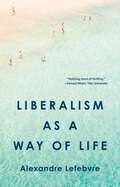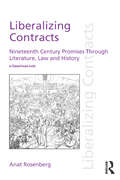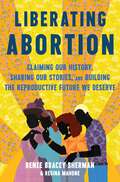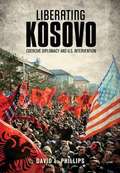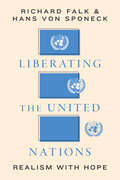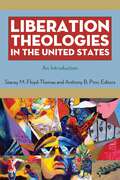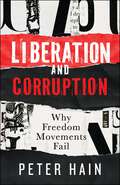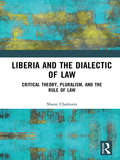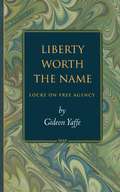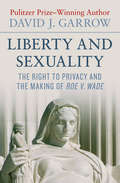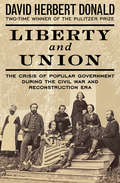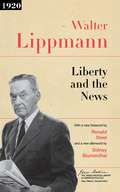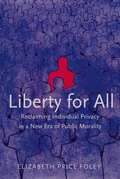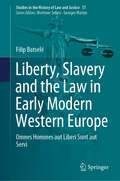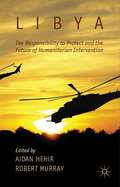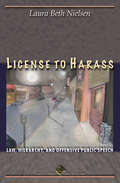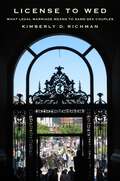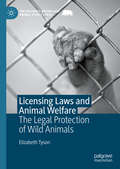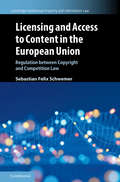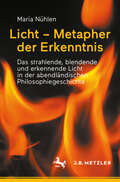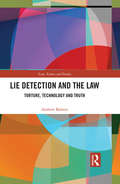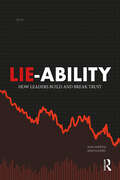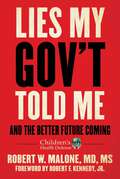- Table View
- List View
Liberalism as a Way of Life
by Alexandre LefebvreWhy liberalism is all you need to lead a good, fun, worthy, and rewarding life—and how you can become a better and happier person by taking your liberal beliefs more seriouslyWhere do you get your values and sensibilities from? If you grew up in a Western democracy, the answer is probably liberalism. Conservatives are right about one thing: liberalism is the ideology of our times, as omnipresent as religion once was. Yet, as Alexandre Lefebvre argues in Liberalism as a Way of Life, many of us are liberal without fully realizing it—or grasping what it means. Misled into thinking that liberalism is confined to politics, we fail to recognize that it&’s the water we swim in, saturating every area of public and private life, shaping our psychological and spiritual outlooks, and influencing our moral and aesthetic values—our sense of what is right, wrong, good, bad, funny, worthwhile, and more. This eye-opening book shows how so many of us are liberal to the core, why liberalism provides the basis for a good life, and how we can make our lives better and happier by becoming more aware of, and more committed to, the beliefs we already hold.A lively, engaging, and uplifting guide to living well, the liberal way, Liberalism as a Way of Life is filled with examples from television, movies, stand-up comedy, and social media—from Parks and Recreation and The Good Place to the Borat movies and Hannah Gadsby. Along the way, you&’ll also learn about seventeen benefits of being a liberal—including generosity, humor, cheer, gratitude, tolerance, and peace of mind—and practical exercises to increase these rewards.You&’re probably already waist-deep in the waters of liberalism. Liberalism as a Way of Life invites you to dive in.
Liberalization of Trade in Banking Services
by Bart De MeesterThe financial crisis struck with full force in the autumn of 2008. Very soon after the start of the crisis, culprits were sought. An important recurring argument was that liberalization of trade in banking services, as pursued at the European (within the EU) and international level (in the WTO), had seriously reduced the possibilities for governments to regulate and supervise the banking sector. This book examines the validity of this claim and considers how EU law and WTO law deal with the trade-off any policy-maker must make between stability and efficiency in the market for banking services. The book considers specifically the interaction between EU and WTO law because the EU is itself a Member of the WTO, next to its Member States. This implies that the EU must respect the obligations it undertook in the framework of the WTO when the EU determines its policy towards third-country banks.
Liberalizing Contracts: Nineteenth Century Promises Through Literature, Law and History
by Anat RosenbergIn Liberalizing Contracts Anat Rosenberg examines nineteenth-century liberal thought in England, as developed through, and as it developed, the concept of contract, understood as the formal legal category of binding agreement, and the relations and human practices at which it gestured, most basically that of promise, most broadly the capitalist market order. She does so by placing canonical realist novels in conversation with legal-historical knowledge about Victorian contracts. Rosenberg argues that current understandings of the liberal effort in contracts need reconstructing from both ends of Henry Maine's famed aphorism, which described a historical progress "from status to contract." On the side of contract, historical accounts of its liberal content have been oscillating between atomism and social-collective approaches, missing out on forms of relationality in Victorian liberal conceptualizations of contracts which the book establishes in their complexity, richness, and wavering appeal. On the side of status, the expectation of a move "from status" has led to a split along the liberal/radical fault line among those assessing liberalism's historical commitment to promote mobility and equality. The split misses out on the possibility that liberalism functioned as a historical reinterpretation of statuses – particularly gender and class – rather than either an effort of their elimination or preservation. As Rosenberg shows, that reinterpretation effectively secured, yet also altered, gender and class hierarchies. There is no teleology to such an account.
Liberalizing International Trade after Doha
by David A. GantzAfter ten years the Doha Development Round is effectively dead. A broadly comprehensive round of trade negotiations reminiscent of the Doha agenda or the Uruguay Round will not likely be attempted again in the foreseeable future. Although some have suggested that Doha's demise threatens the continued existence of the GATT/WTO system, even with some risks of increasing protectionism, the United States, the European Union, Japan, Brazil, China, and India, among others, have far too much to lose to make abandoning the WTO a rational option. If there is reason for cautious optimism post-Doha it is because there are alternatives to a comprehensive package of new or amended multilateral agreements. In addition to likely consensus on a few noncontroversial multilateral elements of Doha, the alternatives include existing and future "plurilateral" trade agreements, new or revised regional trade agreements covering both goods and services, and liberalized national trade laws and regulations in the WTO member nations. This book discusses the alternatives, which although less than ideal, may provide an impetus for continuing trade liberalization both among willing members and in some instances worldwide.
Liberating Abortion: Claiming Our History, Sharing Our Stories, and Building the Reproductive Future We Deserve
by Renee Bracey Sherman Regina MahoneA galvanizing history of abortion recentering people of color to put forth a timely argument that we must liberate abortion for all.People of color have been having abortions since the dawn of time, yet our access is continuously under attack. In Liberating Abortion, award-winning abortion activist Renee Bracey Sherman and journalist Regina Mahone illustrate the long racist history that brought us to this moment, uncover the hidden figures who set the foundation activists and storytellers are building on today, and explain how abortion has been and remains essential to the health of our communities.Liberating Abortion will take you back to the basics of sex education, detailing the traditions of abortion over centuries , while examining how society makes us feel about our experiences. You’ll find rigorous research, never-before-heard stories, and eye-opening interviews with over 50 people of color who’ve had abortions, including activists, actresses, television writers, politicians, and the two Black members of Jane, the Chicago feminist service that provided abortions before Roe. With poignant storytelling and precise analysis, Liberating Abortion will change how you think about abortion forever.
Liberating Kosovo
by David L. PhillipsKosovo, after its incorporation into the Serbian Republic of Yugoslavia, became increasingly restive during the 1990s as Yugoslavia plunged into internal war and Kosovo's ethnic Albanian residents (Kosovars) sought autonomy. In March 1999, NATO forces began airstrikes against targets in Kosovo and Serbia in an effort to protect Kosovars against persecution. The bombing campaign ended in June 1999, and Kosovo was placed under transitional UN administration while negotiations on its status ensued. Kosovo eventually declared independence in 2008. Despite internal political tension and economic problems, the new nation has been recognized by many other countries and most of its inhabitants welcome its separation from Serbia. In Liberating Kosovo, David Phillips offers a compelling account of the negotiations and military actions that culminated in Kosovo's independence. Drawing on his own participation in the diplomatic process and interviews with leading participants, Phillips chronicles Slobodan Milosevic's rise to power, the sufferings of the Kosovars, and the events that led to the disintegration of Yugoslavia. He analyzes how NATO, the United Nations, and the United States employed diplomacy, aerial bombing, and peacekeeping forces to set in motion the process that led to independence for Kosovo. He also offers important insights into a critical issue in contemporary international politics: how and when the United States, other nations, and NGOs should act to prevent ethnic cleansing and severe human-rights abuses.
Liberating the United Nations: Realism with Hope
by Richard A. Falk Hans von SponeckThe United Nations (UN) has always loomed large in international conflicts, but today accepted wisdom declares that the organization has lost its way. Liberating The United Nations is a thorough review of its founding and history that tracks critical junctures that obscured or diverted the path to a powerful and just UN that abides by international law. Based on the extensive expertise of two former UN-insiders, Richard Falk and Hans von Sponeck, the book goes beyond critique and diagnosis, proposing ways to achieve a more effective and legitimate UN. The historical sweep of the book offers a uniquely broad perspective on how the UN has evolved from the time of its establishment, and how that evolution reflects, and was defined by, world politics. The book explores these themes through the specific cases of intervention in Palestine, Iraq, and Syria. Liberating The United Nations hopes to reinvigorate the original vision of the UN by asserting its place in a world of amplifying chauvinistic nationalism. Falk and von Sponeck argue for how important the UN has become, and could be, in aiding with the transnational and global challenges of the present and future, including pandemics, environmental crises, and mass migration.
Liberation Theologies in the United States: An Introduction
by Stacey M Floyd-Thomas Anthony B PinnLiberation Theologies in the United States reveals how the critical use of religion can be utilized to challenge and combat oppression in America. In the nascent United States, religion often functioned as a justifier of oppression. Yet while religious discourse buttressed such oppressive activities as slavery and the destruction of native populations, oppressed communities have also made use of religion to critique and challenge this abuse. As Liberation Theologies in the United States demonstrates, this critical use of religion has often taken the form of liberation theologies, which use primarily Christian principles to address questions of social justice, including racism, poverty, and other types of oppression. Stacey M. Floyd-Thomas and Anthony B. Pinn have brought together a stellar group of liberation theology scholars to provide a synthetic introduction to the historical development, context, theory, and goals of a range of U.S.-born liberation theologies: Black Theology—Anthony B. Pinn Womanist Theology—Stacey M. Floyd-Thomas Latina Theology—Nancy Pineda-Madrid Hispanic/Latino(a) Theology—Benjamín Valentín Asian American Theology—Andrew Sung Park Asian American Feminist Theology—Grace Ji-Sun Kim Native Feminist Theology—Andrea Smith Native American Theology—George (Tink) Tinker Gay and Lesbian Theology—Robert E. Shore-Goss Feminist Theology—Mary McClintock Fulkerson &“An extraordinary resource for understanding the vitality of liberation theologies and their relation to social transformation in the changing U.S. context. Written in an accessible and engaged way, this powerful and informative text will inspire beginners and scholars alike. I highly recommend it."—Kwok Pui-lan, author of Postcolonial Imagination and Feminist Theology &“A delight to read . . . [and] an exemplary account of the genre of liberation theologies." ―Religious Studies Review
Liberation and Corruption: Why Freedom Movements Fail
by Peter HainWhy are liberation and independence movements often betrayed when their leaders get into government? This question has haunted Peter Hain for decades. A lifelong activist and politician, Hain has over 50 years’ experience of battling corruption, from his early days as a freedom fighter against apartheid to his time as a UK Labour MP, cabinet minister, and sitting member of the House of Lords. He offers a gripping exploration of why movements born from the ideals of justice and freedom often succumb to bad governance and corruption once in power. Combining rigorous analysis with well-sourced evidence, this book examines global examples ranging from Africa to Latin America, Russia, the Caribbean, China and India. With the unique perspective of having navigated both the streets of protest and the corridors of power, Hain reflects on the challenges of staying true to the values of liberation struggles while confronting their disappointing outcomes. Thought-provoking and accessible, this book is an essential read for anyone engaged in the fight for a better world.
Liberia and the Dialectic of Law: Critical Theory, Pluralism, and the Rule of Law
by Shane ChalmersIt is the condition of modernity that an institution cannot depend on a god, tradition, or any other transcendental source to secure its foundations, which thereby come to rest upon – or rather in, and through – its subjects. Never wholly separated from its subjects, and yet never identical with them: this contradictory condition provides a way of seeing how modern law gives form to life, and how law takes form, enlivened by its subjects. By driving Theodor Adorno’s dialectical philosophy into the concept of law, the book shows how this contradictory condition enables law to become instituted in ways that are hostile to its subjects, but also how law remains open to its subjects, and thus disposed towards transformation. To flesh out an understanding of this contradiction, the book examines the making and remaking of “Liberia”, from its conception as an idea of liberty at the beginning of the nineteenth century to its reconstruction at the beginning of the twenty-first with the assistance of an international intervention to “establish a state based on the rule of law”. In so doing, the book shows how law is at the epicentre of a colonising power in Liberia that renders subjects as mere objects; but at the same time, the book exposes the instability of this power, by showing how law is also enlivened by its subjects as it takes form in and through their lives and interactions. It is this fundamentally contradictory condition of law that ultimately denies power any absolute hold, leaving law open to the self-expression of its subjects.
Liberty Worth the Name: Locke on Free Agency (Princeton Monographs in Philosophy #5)
by Gideon YaffeThis is the first comprehensive interpretation of John Locke's solution to one of philosophy's most enduring problems: free will and the nature of human agency. Many assume that Locke defines freedom as merely the dependency of conduct on our wills. And much contemporary philosophical literature on free agency regards freedom as a form of self-expression in action. Here, Gideon Yaffe shows us that Locke conceived free agency not just as the freedom to express oneself, but as including also the freedom to transcend oneself and act in accordance with "the good." For Locke, exercising liberty involves making choices guided by what is good, valuable, and important. Thus, Locke's view is part of a tradition that finds freedom in the imitation of God's agency. Locke's free agent is the ideal agent.Yaffe also examines Locke's understanding of volition and voluntary action. For Locke, choices always involve self-consciousness. The kind of self-consciousness to which Locke appeals is intertwined with his conception of personal identity. And it is precisely this connection between the will and personal identity that reveals the special sense in which our voluntary actions can be attributed to us and the special sense in which we are active with respect to them. Deftly written and tightly focused, Liberty Worth the Name will find readers far beyond Locke studies and early modern British philosophy, including scholars interested in free will, action theory, and ethics.
Liberty and Sexuality: The Right to Privacy and the Making of Roe v. Wade
by David J. GarrowPulitzer Prize-winning author David J. Garrow's stirring and essential history of the politics of abortion and America's battle for the right to choose In 1973, the Supreme Court handed down its landmark Roe v. Wade decision legalizing abortion, and more than forty years later the issue continues to spark controversy and divisiveness. But behind this historic legal case lie the battles women fought to establish their rights to use contraceptives and choose to have an abortion. Liberty and Sexuality traces these political and legal struggles in the decades leading up to Roe v. Wade--including the momentous 1965 Supreme Court ruling in Griswold v. Connecticut that established a constitutional "right to privacy." Garrow personalizes the struggles by detailing the vital contributions made by dozens of crusaders who tirelessly paved the way. This expansive and substantial work also addresses the threats to sexual privacy and the legality of abortion that have risen since Roe v. Wade. With abortion still a contentious subject on the national political landscape, Liberty and Sexuality is not just a historical account of the right to choose, but an indispensable read about preserving a freedom that continues to divide America.
Liberty and Union
by David Herbert DonaldThe two-time Pulitzer Prize winner&’s penetrating analysis of the crisis of democracy during the Civil War and Reconstruction eras. In Liberty and Union, David Herbert Donald persuasively examines one of the most tumultuous periods in American history. With the same wit, eloquence, and willingness to question received wisdom that define his acclaimed biographies of Abraham Lincoln and Charles Sumner, Donald suggests that it was the commonalities between North and South—and not their differences—that led to the earth-shattering conflict that was the Civil War and defined the chaotic years that followed. Exploring the political, social, and economic impact of the war, emancipation, Reconstruction, and westward expansion, Donald combines history and philosophy, offering a bold and thought-provoking analysis that goes far in explaining the nation we live in today. Riveting, illuminating, and provocative, Liberty and Union sheds a brilliant light on a half-century of US history and addresses a perennial problem of democratic societies all over the world: how to reconcile majority rule and minority rights.
Liberty and the News (The James Madison Library in American Politics)
by Walter LippmannLiberty and the News is Walter Lippman's classic account of how the press threatens democracy whenever it has an agenda other than the free flow of ideas. Arguing that there is a necessary connection between liberty and truth, Lippman excoriates the press, claiming that it exists primarily for its own purposes and agendas and only incidentally to promote the honest interplay of facts and ideas. In response, Lippman sought to imagine a better way of cultivating the news. A brilliant essay on a persistent problem of American democracy, Liberty and the News is still powerfully relevant despite the development of countless news sources unimagined when Lippman first published it in 1920. The problems he identifies--the self-importance of the press, the corrosion of rumors and innuendo, and the spinning of the news by political powers--are still with us, and they still threaten liberty. By focusing on the direct and necessary connection between liberty and truth, Lippmann's work helps to clarify one of the most pressing predicaments of American democracy today.
Liberty for All: Reclaiming Individual Privacy in a New Era of Public Morality
by Elizabeth Price FoleyIn the opening chapter of this book, Elizabeth Price Foley writes, "The slow, steady, and silent subversion of the Constitution has been a revolution that Americans appear to have slept through, unaware that the blessings of liberty bestowed upon them by the founding generation were being eroded." She proceeds to explain how, by abandoning the founding principles of limited government and individual liberty, we have become entangled in a labyrinth of laws that regulate virtually every aspect of behavior and limit what we can say, read, see, consume, and do. Foley contends that the United States has become a nation of too many laws where citizens retain precious few pockets of individual liberty. With a close analysis of urgent constitutional questions--abortion, physician-assisted suicide, medical marijuana, gay marriage, cloning, and U. S. drug policy--Foley shows how current constitutional interpretation has gone astray. Without the bias of any particular political agenda, she argues convincingly that we need to return to original conceptions of the Constitution and restore personal freedoms that have gradually diminished over time.
Liberty, Slavery and the Law in Early Modern Western Europe: Omnes Homines aut Liberi Sunt aut Servi (Studies in the History of Law and Justice #17)
by Filip BatseléThis book investigates the legal evolution of the “free soil principle” in England, France and the Low Countries during the Early Modern period (ca. 1500–1800), which essentially stated that, as soon as slaves entered a certain country, they would immediately gain their freedom. This book synthesizes the existing literature on the origins and evolution of the principle, adds new insights by drawing on previously undiscussed primary sources on the development of free soil in the Low Countries and employs a pan-Western, European and comparative approach to identify and explain the differences and similarities in the application of this principle in France, England and the Low Countries. Divided into four sections, the book begins with a brief introduction to the subject matter, putting it in its historical context. Slavery is legally defined, using the established international law definition, and both the status of slavery in Europe before the Early Modern Period and the Atlantic slave trade are discussed. Secondly, the book assesses the legal origins of the free soil principle in England, France and the Low Countries during the period 1500–1650 and discusses the legal repercussions of slaves coming to England, France and the Low Countries from other countries, where the institution was legally recognized. Thirdly, it addresses the further development of the free soil principle during the period 1650–1800. In the fourth and last section, the book uses the insights gained to provide a pan-Western, European and comparative perspective on the origins and application of the free soil principle in Western Europe. In this regard, it compares the origins of free soil for the respective countries discussed, as well as its application during the heyday of the Atlantic slave trade. This perspective makes it possible to explain some of the divergences in approaches between the countries examined and represents the first-ever full-scale country comparison on this subject in a book.
Libya, the Responsibility to Protect and the Future of Humanitarian Intervention
by Aidan Hehir Robert MurrayThis book critically analyses the 2011 intervention in Libya arguing that the manner in which the intervention was sanctioned, prosecuted and justified has a number of troubling implications for the both the future of humanitarian intervention and international peace and security.
License to Harass: Law, Hierarchy, and Offensive Public Speech (The Cultural Lives of Law)
by Laura Beth NielsenOffensive street speech--racist and sexist remarks that can make its targets feel both psychologically and physically threatened--is surprisingly common in our society. Many argue that this speech is so detestable that it should be banned under law. But is this an area covered by the First Amendment right to free speech? Or should it be banned? In this elegantly written book, Laura Beth Nielsen pursues the answers by probing the legal consciousness of ordinary citizens. Using a combination of field observations and in-depth, semistructured interviews, she surveys one hundred men and women, some of whom are routine targets of offensive speech, about how such speech affects their lives. Drawing on these interviews as well as an interdisciplinary body of scholarship, Nielsen argues that racist and sexist speech creates, reproduces, and reinforces existing systems of hierarchy in public places. The law works to normalize and justify offensive public interactions, she concludes, offering, in essence, a "license to harass." Nielsen relates the results of her interviews to statistical surveys that measure the impact of offensive speech on the public. Rather than arguing whether law is the appropriate remedy for offensive speech, she allows that the benefits to democracy, to community, and to society of allowing such speech may very well outweigh the burdens imposed. Nonetheless, these burdens, and the stories of the people who bear them, should not remain invisible and outside the debate.
License to Wed: What Legal Marriage Means to Same-Sex Couples
by Kimberly D. RichmanA critical reader of the history of marriage understands that it is an institution that has always been in flux. It is also a decidedly complicated one, existing simultaneously in the realms of religion, law, and emotion. And yet recent years have seen dramatic and heavily waged battles over the proposition of including same sex couples in marriage. Just what is at stake in these battles?License to Wed examines the meanings of marriage for couples in the two first states to extend that right to same sex couples: California and Massachusetts. The two states provide a compelling contrast: while in California the rights that go with marriage—inheritance, custody, and so forth—were already granted to couples under the state’s domestic partnership law, those in Massachusetts did not have this same set of rights. At the same time, Massachusetts has offered civil marriage consistently since 2004; Californians, on the other hand, have experienced a much more turbulent legal path. And yet, same-sex couples in both states seek to marry for a variety of interacting, overlapping, and evolving reasons that do not vary significantly by location.The evidence shows us that for many of these individuals, access to civil marriage in particular—not domestic partnership alone, no matter how broad—and not a commitment ceremony alone, no matter how emotional—is a home of such personal, civic, political, and instrumental resonance that it is ultimately difficult to disentangle the many meanings of marriage. This book attempts to do so, and in the process reveals just what is at stake for these couples, how access to a legal institution fundamentally alters their consciousness, and what the impact of legal inclusion is for those traditionally excluded.
Licensing Laws and Animal Welfare: The Legal Protection of Wild Animals (The Palgrave Macmillan Animal Ethics Series)
by Elizabeth TysonThis book considers the efficacy of the common regulatory model of the licensing regime as a means of regulating animal use in England, with a particular focus on wild animals and the regime’s ability to ensure animal welfare needs are met. Using information gleaned from over 550 inspection reports relating to the period 2008 through 2019, obtained using FOI Act requests, the book analyses the extent to which animals used by these industries are protected by law. Tyson analyses the limitations present in the practical application of English legislation responsible for creating a number of relevant licensing regimes.The regimes discussed include: The Zoo Licensing Act 1981, the now repealed Welfare of Wild Animals in Travelling Circuses Regulations 2012, and the Animal Welfare (Licensing of Activities Involving Animals) Regulations 2018, introduced under the Animal Welfare Act 2006.Exploring the weakness in the use of this type of regulatory model, Tyson proposes compelling recommendations for change in future policy development. Making an important contribution to the question of enforcement of animal welfare laws, this book provides useful and original insights into the implementation of licensing regimes, and will be of particular interest to scholars of animal welfare law, animal ethics, and critical animal studies.
Licensing and Access to Content in the European Union: Regulation between Copyright and Competition Law (Cambridge Intellectual Property and Information Law #49)
by Sebastian Felix SchwemerCopyright is territorial, but the same cannot be said of the internet, whose borderless nature has changed the way we consume copyright-protected material. Nevertheless, territorial segmentation of online content remains a reality in the 28 member states of the European Union. Licensing and access practices do not reflect this digital reality, in which end-users demand ubiquitous access to content. For this reason, the territorial nature of copyright and traditional business models based on national exploitation prevent the completion of the Digital Single Market. Sebastian Felix Schwemer provides a unique analysis of the dynamic licensing and access arrangements for audiovisual works and music and shows how they are being addressed by sector regulation and competition law in the Digital Single Market. His analysis, which includes case law of the Court of Justice, the Commission's competition proceedings, and various legislative tools, reveals the overlapping nature of legislative and non-legislative regulatory solutions.
Licht – Metapher der Erkenntnis: Das strahlende, blendende und erkennende Licht in der abendländischen Philosophiegeschichte
by Maria NühlenDas Licht als Metapher der Erkenntnis gehört zur abendländischen Tradition der Bildsprache allgemein, insbesondere aber in der Philosophie. Die Erfahrung eines neuen Gedankens, einer neuen Idee oder einer neuen Erkenntnis haben wir, vielleicht mangels eigener sprachlicher Begrifflichkeit, für genau diesen geistigen Vorgang in eine Metapher übertragen, indem wir mit der Vorstellung arbeiten, die sinnliche Wahrnehmung der physischen Erscheinung des Lichts sei vergleichbar mit der geistigen Wahrnehmung eines neuen Gedankens. Durch das Licht sehen wir die Welt und die Dinge in ihr, durch den Geist erkennen wir Weltzusammenhänge, Arten des Seins, Wahrheiten, Kategorien, Strukturen, Hierarchien, was auch immer. Das Hauptanliegen dieses Buches ist es, die Lichtmetapher in ihrer philosophisch-historischen Bedeutung – exemplarisch - aufzuarbeiten, indem es die Philosophiegeschichte nach der Verwendung der Lichtmetapher durchforstet. Wer (1) hat wozu (2) mit welcher philosophischen Aussage (3) die Lichtmetapher benutzt? Das Buch regt so zum Nachdenken über diese Aussagen an und den Diskurs über die Lichtmetapher und die Intelligibilität des Denkens.
Lie Detection and the Law: Torture, Technology and Truth (Law, Science and Society)
by Andrew BalmerThis book develops a sociological account of lie detection practices and uses this to think about lying more generally. Bringing together insights from sociology, social history, socio-legal studies and science and technology studies (STS), it explores how torture and technology have been used to try to discern the truth. It examines a variety of socio-legal practices, including trial by ordeal in Europe, the American criminal jury trial, police interrogations using the polygraph machine, and the post-conviction management of sex offenders in the USA and the UK. Moving across these different contexts, it articulates how uncertainties in the use of lie detection technologies are managed, and the complex roles they play in legal spaces. Alongside this story, the book surveys some of the different ways in which lying is understood in philosophy, law and social order. Lie Detection and the Law will be of interest to STS researchers, socio-legal scholars, criminologists and sociologists, as well as others working at the intersections of law and science.
Lie-Ability: How Leaders Build and Break Trust
by Simon Jones Alan WatkinsBusiness success depends on the ability to build trust. Trusted brands succeed and sustain. Trusted leaders inspire followers, grow companies, revenues and futures. But sadly, deceit has infected business and become widespread. Far too many leaders now use their own "alternative facts", to mislead and misinform their customers, colleagues and communities. The skilfulness and ease with which some leaders now lie has become a Lie-Ability. And when customers stop trusting the products, services or the stories a leader tells, then the business suffers. If business leaders don’t lead a truth renaissance, we are all lost. People no longer trust politicians or the media. And many of the institutions and professions we used to turn to have also lost trust. The only people that can really save us now are business leaders. We need to become truth advocates and activists. We must re-establish a new norm where we tell the truth to ourselves, to our employees, to our shareholders, to our customers and to society at large. This book explores the 7 Deadly Lies that business tells itself, the 7 Dark Arts of Deception that are still used with monotonous regularity to manipulate the narrative. It offers C-suite leaders and senior managers a clear path out of deceit. It provides a solution to the Lie-Ability of some leaders by developing a deeper understanding of truth, how to reclaim it and how to build back trust.
Lies My Gov't Told Me: And the Better Future Coming (Children’s Health Defense)
by Robert W. Malone**AS SEEN ON TUCKER CARLSON TODAY AND THE JOE ROGAN EXPERIENCE**A guide for the times—breaking down the lies about COVID-19 and shedding light on why we came to believe them. When he invented the original mRNA vaccine technology as a medical and graduate student in the late 1980s, Robert Malone could not have imagined that he would become a leader in a movement to expose the dangers of mRNA vaccines that billions of people have received—too often without being informed of the risks. For voicing opposition to the &“mainstream&” narrative, Dr. Robert Malone was censored by Big Tech and vilified by the media. But he continues to speak out and alert the world to the web of lies that we have all experienced. From vaccine safety and effectiveness to early treatments like ivermectin, to lockdowns, masks, and more, Dr. Malone is the signature dissident voice telling the other side of the story about COVID, the role of corporate media, censorship, propaganda, and the brave new world of transhumanism promoted by the World Economic Forum and its acolytes. What effect did the COVID policies have on lives, livelihoods, and democracies? How is it possible that the lies spread by governments would persist, and that our institutions would fail to correct them? Lies My Gov&’t Told Me takes a hard look at these questions and illustrates how data, information, and psychology have been distorted during the pandemic. Governments intentionally weaponized fear to mold behavior. The media smeared anyone who objected to the narrative. And Big Pharma—aligned with larger globalist interests exemplified by the likes of Bill Gates and the World Economic Forum—had captured the agencies that are supposed to regulate it long before the pandemic began. Dr. Malone explores these perverse connections between Pharma, government, and media, and tells us what can be done about it. With contributed chapters from other leading thinkers, such as Dr. Paul Marik and Professor Mattias Desmet, and drawing upon history, psychology, and economics, Lies My Gov&’t Told Me looks at COVID from numerous angles. Never satisfied with a simple answer or easy solution, Dr. Malone proposes multiple action plans for a better future. Dr. Malone calls on each of us to find our own solutions, our own ways to resist the control of fascist, corporatist, and totalitarian overlords. If we are to step out of the darkness—toward a world that defends the principles of the Constitution, upholds individual rights, and honors free speech—we all must play a part in the transition.
